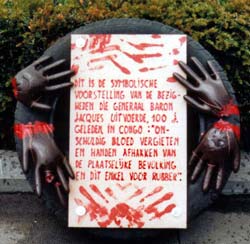
I like Heart of Darkness, but at the same time I do not like Heart of Darkness. I know it is suppose to be one of the best pieces of literature ever written, but I have issues with it, aside from Conrad's portrayal of Africans that was covered in the last blog. I kinda thought I was on my own with those feelings but apparently Chinua Achebe beat me to the punch.
I love what Chinua Achebe says in the beginning in response to a young Yonkers Native that enjoyed the strange customs of Africa in Things Fall Apart. think for a second, don't just gloss over my blog, what kind of strange things do you do. Imagine that you haven't alway
 s grown up in the United States and only saw it in a quick glimpse. Let me tell you of a few things I thought up, aside from religions being funny (like wine turning into a Jewish mans blood to wine or eggs on Easter), how about people wearing the same things every Sunday to help their team out? The superstition at Western that if you step on the W by the library you will fail your first exam? Or think way back, when you had a Nintendo that you and only you were able to fix your own game cartridges, even though all people blow the same way?
s grown up in the United States and only saw it in a quick glimpse. Let me tell you of a few things I thought up, aside from religions being funny (like wine turning into a Jewish mans blood to wine or eggs on Easter), how about people wearing the same things every Sunday to help their team out? The superstition at Western that if you step on the W by the library you will fail your first exam? Or think way back, when you had a Nintendo that you and only you were able to fix your own game cartridges, even though all people blow the same way?I like that Achebe says that he refuses to accept Conrad's account of Africa in Heart of Darkness. I too do not want to take his word for it just because I have never set foot in Africa. Look at Sir Henry Stanley, we know now that he made up large portions of his stories and books but at the time they were taken as gospel because no one could disprove him. Plus it is a book, books even ones based on facts normally construe and exaggerate facts to make something sell. How can we be sure he did not make up things or use words to sell his book. Like him being fixated on blackness. His description of black people was obviously slanted to be sold to a certain crowd, who is to say Conrad didn't make up the bulk of his journey, people do it all the time!
Toward the end of his writing Achebe gives Conrad some credit for his writing. Conrad told of porters who crawled off to the side of the road to die. Give credit for him showing how Europeans mistreated the Africans they "hired". I will begrudging give him credit for showing Africans suffering. My thoughts are this, I don't think Conrad knew how to illustrate African's through the story and I can understand why. It's kinda like class the other week when no one wanted to come out and say that Roger Casement was gay, it is a taboo still in society. For Conrad, Africans would still be a taboo, Africans not Black people mind you. How do you represent a person/ group of people that you have nothing in common with? How do you adequately represent what you want to get across to the audience knowing that they do not have a heavy background in all things Africa? This is like a when you write your first research paper. You do all sorts of research and you are ready to show off EVERYTHING you know, despite if it fits or not. This is the problem I see in Conrad, he has so much to tell, so much he has seen and he wants to fit it all into his story. But, to prove a point you need to stick with one side of the story, not just shotgun everything you can think of into the work.

















